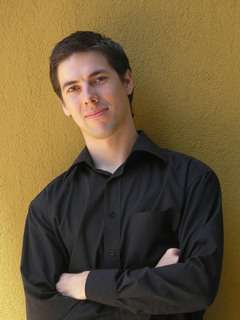|
Back
Fragments of a Hallucination New York
Florence Gould Hall, 55 East 59th Street
11/20/2009 - November 21, 2009
Claude Debussy and Edgar Allan Poe: The Devil in the Belfry & The Fall of the House of Usher
Philip Addis (Roderick Usher), Ariadne Grelf (Madeleine Usher), Michael Chioldi (The Doctor), Daivd McFerrin, Alexandre Blaise (Friend of Usher)
Jeff Cohen (Music Director/Pianist), Jean-Philippe Clarac & Oliver Delœuil (Stage Directors and Opéra Français New York Co-Artistic Directors), Katherine Patterson (Costume Designer), Chelsea Antrim (Stage Manager), French Institute/Alliance Française (Producers)

Phillip Addis (© Opéra français de New York)
As Jerry Lewis was the American Idol of France in the 1990’s, Edgar Allan Poe became an idol to the Parisian artistic elite a century before. Barely respected in his own country, Poe–the fantasist, poet, alcoholic, the original detective-story writer, and, without knowing it, the first symbolist of the inner mind–became the darling of every French poet, musician and writer. No less a figure than Charles Baudelaire translated Poe, Verlaine claimed spiritual descent from Poe, and the Belgian Maurice Maeterlinck claimed Poe was his sole inspiration for Pelléas et Mélisande.
Claude Debussy not only was awed by Poe (in the Baudelaire translation) but worked all of his productive life on two operas commissioned by the Metropolitan Opera of New York, based on two Poe stories. Neither was ever finished, and most of the music was never found.
From the little we know of his operas, and from the much we know of Debussy’s penchant as a composer, he would have created two magnificent operas. For just as Poe sometimes rambled on in his tales, setting atmosphere above story, descriptions above action, the feeling of the senses above mere sensibility, Debussy followed much the same path in his single opera, and much of his music.
So what does one do with the few fragments left of the operas? In a way, they were like the fragments of Sappho. The latter is intriguing but leaving much to the imagination. Debussy’s fragments, though, can be related to his complete opus, his letters and comments of his peers.
And, as this weekend’s productions of the Alliance Française show, the imaginations of a splendid auteur, Jeff Cohen who arranged the music,. Admitting that Debussy gave him little to go on, the composer having left only a single tempo indication (lent et douleureux: slow and painful), and only one musical dynamic (pp: very quiet), Mr. Cohen had an Augean challenge.
First, he wanted to blend both stories. Second, he needed Debussy’s music for the stories, while adding four additional melodies. Third, with co-directors Jean-Philippe Clarac and Olivier Delœuil, he had to give a cohesive blending of the macabre, the musical, and the Poe-etic with staging that would emphasize all these factors.
That staging is indeed wonderful. All takes place in the library of the doomed House of Usher. We have the library–hundreds of books, lit from behind like a lattice, read, discarded, moving with the stage until the entire bookcase disintegrates at the end. (Poe actually gives the names of the books, from Machiavelli to Swedenborg to the Dominican Rules of the Inquisition in Latin.)
In Poe’s original, Roderick Usher is reading with a friend, becoming gloomier about his dead beloved sister. Here he has two friends, who enter via the auditorium aisles like apparitions. The doctor–the narrator of the story–plays a more dynamic role, singing the opening Paul Verlaine melody, taking charge of the stage, yet overseeing all, like a guardian angel…or demon.
After the opening, Mr. Cohen takes the few fragments written for The Devil in the Belfry, and above that a young boy and girl recite the words of Poe from the book. The music is not very effective. The usual tremolos, a series of augmented chords in the left hand.
After this, though, the Usher begins. Again, not much music, but two songs sung by the “doctor” and the friend, with a long monologue by “Roderick”–a wonderfully emotional performance by Philip Addis–lead to another insert. In this case “Footsteps in the Snow” from the Preludes. That leads to the final scene from Usher, where the ghost of Marchesa Madelene makes her entrances, the characters grow frantic (but quietly melodically frantic), and the bookshelves crumble.
The music here is, yes, the style of Pelléas, chants above the piano. One would have imagined that Debussy might have written an actual aria in league with the long poem which Poe puts into the story with, what the doctor calls, “the wild fantasia” for guitar.
But one can only guess at Debussy’s intentions. Musically, Mr. Cohen has done a masterful job with his sparse materials. But more important is the mood–or as Poe might have penned, “the DIABOLICAL fiendish mood”. True, shining faces with flashlights doesn’t sound fiendish, but it actually works with the otherwise muted lighting and the glow behind the bookcase. Mr. Cohen’s piano on the side adds all the Debussy background that we need, and the panting emotional acting and universally fine chant-singing adds to the atmosphere.
At the end, one regrets the lack of an opera, but one must consider who could have done it better. Obviously Berlioz, whose life overlapped that of Poe (and if Berlioz could have stopped mooning about Shakespeare actresses). Mussorgsky, no. Having two moody, phantasmagorical alcoholics together would have been a tautology. Leos Janácek would have been ideal. Had Martinů set Poe instead of Julietta to music, that would certainly have worked.
And then there was Mozart. And I cannot think of any better finale for The Fall of the House of Usher than the agonizing fall of Don Giovanni.
Instead, we have Debussy’s scraps of music and intentions. Not very much to go on, alas, but we still have the writings of Poe, the music of Debussy, and, best of all, our own sometimes inflamed inspiration after experiencing both.
Harry Rolnick
|